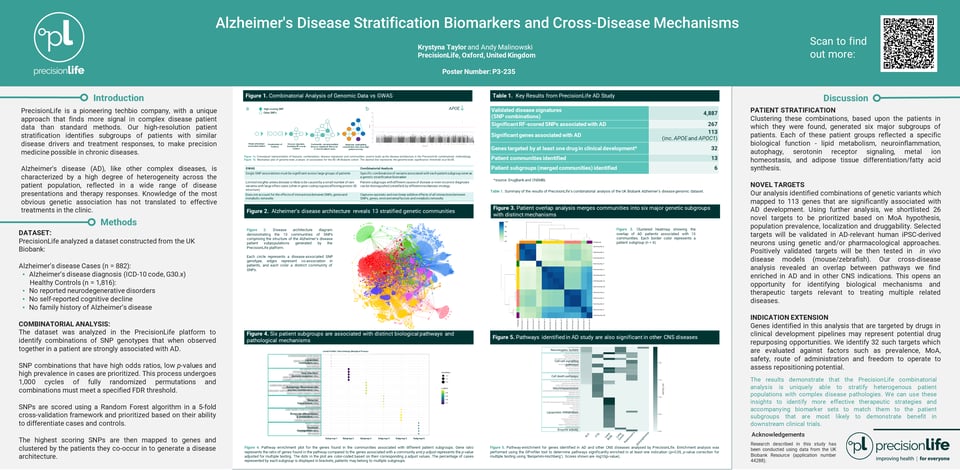Presented at the Alzheimer's Association International Conference 2023
Authors: Krystyna Taylor, Andy Malinowski
Download the poster
Alzheimer's disease (AD) is characterised by a high degree of heterogeneity in the patient population. GWAS have identified several disease-associated genes, but these findings have not translated into progress in the clinic. This likely reflects the limitations of GWAS in only identifying single variants, while the key to understanding and treating complex diseases that are influenced by multiple genetic loci is to find combinations of variants that distinguish patient subgroups.
The PrecisionLife platform utilises a hypothesis-free method for the detection of combinations of features that together are strongly associated with variations in disease risk, symptoms, progression rates and therapy response.
To explore the diversity within the AD population we analysed a genomic dataset from the UK Biobank, including 882 patients diagnosed with AD, compared against healthy controls. Subsequently, pathway enrichment analysis was performed to identify biological mechanisms underlying the AD patient subgroups that are shared with other CNS indications.
Our analysis identified combinations of genetic variants which mapped to 113 genes that are significantly associated with AD pathology. These include known and novel genes. Clustering of these combinations, based upon the degree of patient overlap, revealed six distinct subgroups. Each patient subgroup reflected a specific biological function - lipid metabolism, neuroinflammation, autophagy, serotonin signaling, metal ion homeostasis, and metabolic dysfunction.
PrecisionLife’s patient stratification approach enables understanding of shared genetic aetiologies and underlying dysregulated biological processes across multiple diseases where there is evidence of overlapping symptomology. We performed a pathway enrichment analysis, using the patient stratification results from the AD study, to find commonalities identified in other patient datasets, including FTD, schizophrenia and long COVID. We were able to identify multiple AD-associated pathways that are significantly enriched in at least one additional disease. These included processes associated with neurotransmission, cell death signalling and lipoprotein metabolism.
The results demonstrate that combinatorial analysis can stratify heterogenous patient populations with complex pathologies to identify effective therapeutic strategies with accompanying biomarkers, improving the probability of success in AD drug development and opening an opportunity for identifying biological mechanisms and pathways relevant to treating multiple, related CNS diseases.
Alzheimer's disease study
Stratifying patient subgroups to increase the probability of future clinical trial success in Alzheimer's disease.
"This is a quote about something or other, test da ba dee da ba doo. Lorem Ispum Lorem Ipsum"
Name Surname, Position, Company



